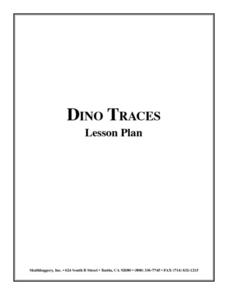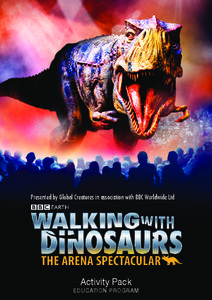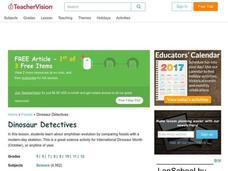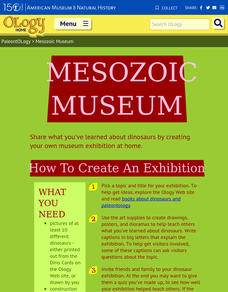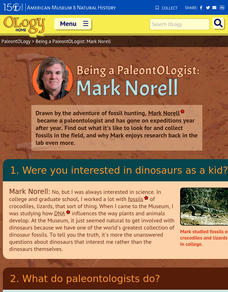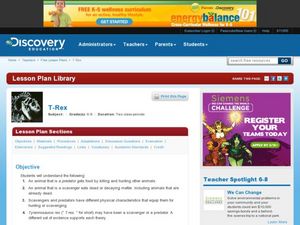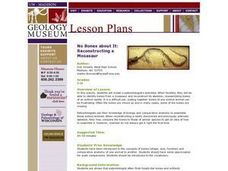Curated OER
Dino Traces
Students are introduced to the type of evidence that is found at a typical dinosaur dig. They create rubbing casts of bone impressions on paper and, using bones, identify dinosaurs.
Curated OER
Dig It!
Second graders complete various activities about dinosaurs and fossils. They conduct Internet research, participate in a sandbox dinosaur fossil dig, and create a computer slideshow presentation using information they found on various...
Curated OER
Paleontologist: Can You Dig It?
Students investigate what a paleontologist does. They participate in a dinosaur dig, write a story, and explore the Dinosaur Dig website to view and discuss photos of a real dinosaur dig.
Curated OER
Dinosaur Detectives
Learners write a report about a paleontologist. In this paleontology lesson, students research and write a report about a noted paleontologist. They discuss the importance of technology to paleontologists and how paleontologist excavate...
BBC
Walking with Dinosaurs
Breath new life into your class's study of dinosaurs with this extensive collection of materials. Offering everything from a printable T-rex mask, word searches, and connect-the-dots activities to informational handouts, hands-on...
Curated OER
Dinosaur Detectives
Students examine amphibian evolution by comparing fossils with a modern-day skeleton. They experience the scientific thought process of drawing conclusions from limited paleontological data. Student groups align the figures with the...
Curated OER
Draw T. rex
Students explore how scientists determine what prehistoric animals looked like based on their bones. They draw a picture of the skull of a Tyrannosaurus Rex by copying an image from an overhead or book.
American Museum of Natural History
Mesozoic Museum
Mini museum curators create an exhibit that showcases the Mesozoic era. Pupils use their knowledge of dinosaurs to make informative posters, drawings, and dioramas. Following three steps to complete the hands-on activity, scholars read...
American Museum of Natural History
Being a Paleontologist: Mark Norell
Get to know paleontologist Mark Norell with a 19 question interview. Written questions, answers, and photographs with descriptions sit among bright and cheery graphics
American Museum of Natural History
Buried Bones
Patience is the name of the game. Using Plaster of Paris and chicken bones, learners simulate an archeological dig site. They excavate the chicken bones over a period of several days using tools and a large amount of patience.
Curated OER
Excavation Dig
Students engage in a role-play of a dinosaur excavation dig. They dig through sand to locate buried bones and then discuss the ethics of destroying buildings and other property to get at the fossil remains.
Curated OER
A Scientific Approach to Teaching about Evolution
Students examine fossils and analyzing their significance in relation to theories of evolution. Hand-outs are provided. This lesson could be supplementary to a broader unit on evolution or geology.
Curated OER
Dinosaur I Finding And Dating
Students investigate how long dinosaurs lived on Earth and how that compare to how long man has been on Earth. They discover how scientists excavate fossils.
Curated OER
It's All In The Rocks
Students think critically to determine fact or inference when examining sedimentary layers with embedded fossils. Geology and evolutionary biology are introduced. They individually write a story about various diagrams and share their...
Curated OER
Scientists Study Dinosaur "Mummy"
Students share ideas about how scientists know about dinosaurs, then read a news article about the recently found remains of a hadrosaur. In this dinosaur lesson plan, the teacher introduces the article with a class discussion and...
Curated OER
T-Rex
Young scholars examine the differences between a scavenger and a predator. For this predator lesson students research an animal and study its physical traits.
Curated OER
Studying Fossils: Dinosaur Tracks From Stride to leg Length to Speed
Learners explore dinosaurs. Students determine the relationship between leg length, stride length, and speed in humans and bipedal dinosaurs. Learners analyze collected information. Based upon the data, dinosaur tracks, and fossils,...
Curated OER
We Really Dig Archeology and Palentology
Sixth graders examine the differences between archeology and paleontology. Using the internet, they explore the tools and techniques used in each field. They must use the correct tools to uncover and record the objects they find. They...
Channel Islands Film
Arlington Springs Man: Lesson Plan 2
West of the West's documentary Arlington Springs Man and a two-page scientific article about the same topic provide the text for a reading comprehension exercise that asks individuals to craft a one page summary of information gathered...
Curated OER
Plate Tectonics
Help young scientists piece together the theory of plate tectonics with this comprehensive collection of materials. Whether your are looking for worksheets, hands-on activities, or assessments, this resource has everything a science...
Curated OER
No Bones About It
Students act as paleontologists, examining pictures of dinosaur skeletons and applying their knowledge of the relationship between skeletal features and survival, to create 'Paleontology Reports' about their perceptions of the lives of...
Curated OER
Digging Into Science Lesson Plans
In this biology worksheet, students identify and write the various species that are still present today. Then they define evolution using three words. Students also describe what a fossil is and give some examples related to a particular...
Curated OER
Becoming Whales: Experiencing Discoveries of
Students experience, through a "dig," the historical discovery of fossils which increasingly link whales to earlier land-dwelling mammals. They encounter the intermediate forms which show changes that lead to the modern whale.
Curated OER
No bones About It -A Mosasaur
Students model a paleontologist's activities. They identify dinosaur bones and reassemble them into a skeleton of an extinct reptile.


